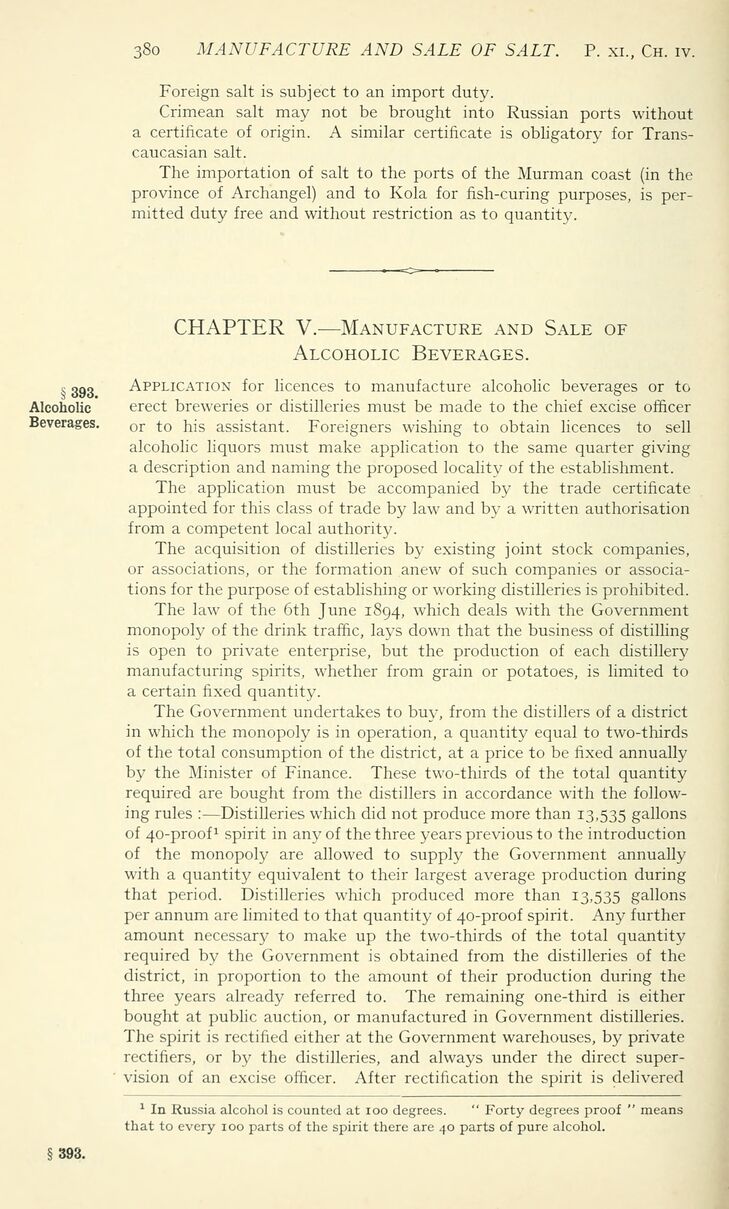
Full resolution (JPEG) - On this page / på denna sida - Pages ...

<< prev. page << föreg. sida << >> nästa sida >> next page >>
Below is the raw OCR text
from the above scanned image.
Do you see an error? Proofread the page now!
Här nedan syns maskintolkade texten från faksimilbilden ovan.
Ser du något fel? Korrekturläs sidan nu!
This page has never been proofread. / Denna sida har aldrig korrekturlästs.
38o MANUFACTURE AND SALE OF SALT. P. xi., Сн. iv.
Foreign salt is subject to an import duty.
Crimean salt may not be brought into Russian ports without
a certificate of origin. A similar certificate is obligatory for
Trans-caucasian salt.
The importation of salt to the ports of the Murman coast (in the
province of Archangel) and to Kola for fish-curing purposes, is
permitted duty free and without restriction as to quantity.
CHAPTER V.—Manufacture and Sale of
Alcoholic Beverages.
Application for licences to manufacture alcoholic beverages or to
erect breweries or distilleries must be made to the chief excise officer
or to his assistant. Foreigners wishing to obtain licences to sell
alcoholic liquors must make application to the same quarter giving
a description and naming the proposed locality of the establishment.
The application must be accompanied by the trade certificate
appointed for this class of trade by law and by a written authorisation
from a competent local authority.
The acquisition of distilleries by existing joint stock companies,
or associations, or the formation anew of such companies or
associations for the purpose of establishing or working distilleries is prohibited.
The law of the 6th June 1894, which deals with the Government
monopoly of the drink traffic, lays down that the business of distilling
is open to private enterprise, but the production of each distillery
manufacturing spirits, whether from grain or potatoes, is limited to
a certain fixed quantity.
The Government undertakes to buy, from the distillers of a district
in which the monopoly is in operation, a quantity equal to two-thirds
of the total consumption of the district, at a price to be fixed annually
by the Minister of Finance. These two-thirds of the total quantity
required are bought from the distillers in accordance with the
following rules :—Distilleries which did not produce more than 13,535 gallons
of 40-proof1 spirit in any of the three years previous to the introduction
of the monopoly are allowed to supply the Government annually
with a quantity equivalent to their largest average production during
that period. Distilleries which produced more than 13,535 gallons
per annum are limited to that quantity of 40-proof spirit. Any further
amount necessary to make up the two-thirds of the total quantity
required by the Government is obtained from the distilleries of the
district, in proportion to the amount of their production during the
three years already referred to. The remaining one-third is either
bought at public auction, or manufactured in Government distilleries.
The spirit is rectified either at the Government warehouses, by private
rectifiers, or by the distilleries, and always under the direct
supervision of an excise officer. After rectification the spirit is delivered
1 In Russia alcohol is counted at 100 degrees. " Forty degrees proof " means
that to every 100 parts of the spirit there are 40 parts of pure alcohol.
§ 393.
§ 393.
Alcoholic
Beverages.
<< prev. page << föreg. sida << >> nästa sida >> next page >>